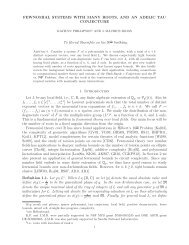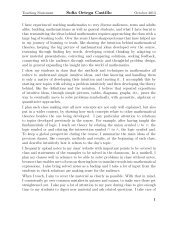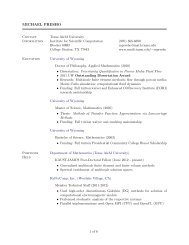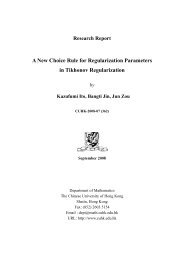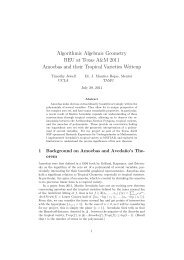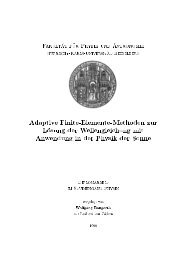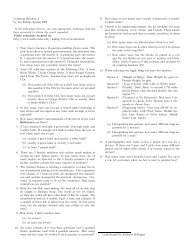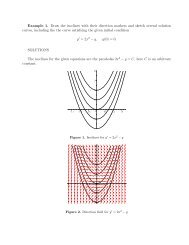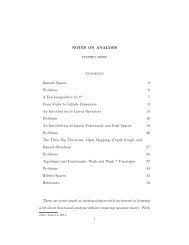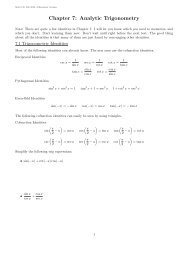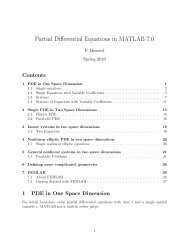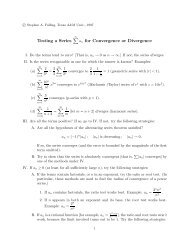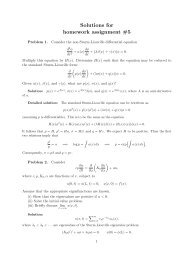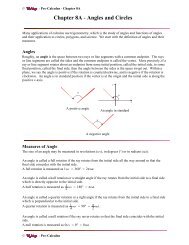Pythagoras and the Pythagoreans - Department of Mathematics
Pythagoras and the Pythagoreans - Department of Mathematics
Pythagoras and the Pythagoreans - Department of Mathematics
Create successful ePaper yourself
Turn your PDF publications into a flip-book with our unique Google optimized e-Paper software.
<strong>Pythagoras</strong> <strong>and</strong> <strong>the</strong> <strong>Pythagoreans</strong> 5<br />
<strong>the</strong> “virtue <strong>of</strong> contemplation” acquired <strong>the</strong>ological endorsement, <strong>and</strong><br />
because <strong>the</strong> ideal <strong>of</strong> disinterested truth dignified <strong>the</strong> academic life.<br />
The Pythagorean Philosophy ála Bertr<strong>and</strong> Russell<br />
From Bertr<strong>and</strong> Russell, 5 ,wehave<br />
“It is to this gentleman that we owe pure ma<strong>the</strong>matics.<br />
The contemplative ideal — since it led to pure ma<strong>the</strong>matics<br />
— was <strong>the</strong> source <strong>of</strong> a useful activity. This increased it’s<br />
prestige <strong>and</strong> gave it a success in <strong>the</strong>ology, in ethics, <strong>and</strong> in<br />
philosophy.”<br />
Ma<strong>the</strong>matics, so honored, became <strong>the</strong> model for o<strong>the</strong>r sciences.<br />
Thought became superior to <strong>the</strong> senses; intuition became superior to<br />
observation. The combination <strong>of</strong> ma<strong>the</strong>matics <strong>and</strong> <strong>the</strong>ology began with<br />
<strong>Pythagoras</strong>. It characterized <strong>the</strong> religious philosophy in Greece, in <strong>the</strong><br />
Middle ages, <strong>and</strong> down through Kant. In Plato, Aquinas, Descartes,<br />
Spinoza <strong>and</strong> Kant <strong>the</strong>re is a blending <strong>of</strong> religion <strong>and</strong> reason, <strong>of</strong> moral<br />
aspiration with logical admiration <strong>of</strong> what is timeless.<br />
Platonism was essentially Pythagoreanism. The whole concept<br />
<strong>of</strong> an eternal world revealed to intellect but not to <strong>the</strong> senses can be<br />
attributed from <strong>the</strong> teachings <strong>of</strong> <strong>Pythagoras</strong>.<br />
The Pythagorean School gained considerable influence in Croton<br />
<strong>and</strong> became politically active — on <strong>the</strong> side <strong>of</strong> <strong>the</strong> aristocracy. Probably<br />
because <strong>of</strong> this, after a time <strong>the</strong> citizens turned against him <strong>and</strong> his<br />
followers, burning his house. Forced out, he moved to Metapontum,<br />
also in Sou<strong>the</strong>rn Italy. Here he died at <strong>the</strong> age <strong>of</strong> eighty. His school lived<br />
on, alternating between decline <strong>and</strong> re-emergence, for several hundred<br />
years. Tradition holds that <strong>Pythagoras</strong> left no written works, but that<br />
hisideaswerecarriedonbyeagerdisciples.<br />
5 A History <strong>of</strong> Western Philosophy. Russell was a logician, ma<strong>the</strong>matician <strong>and</strong> philosopher from<br />
<strong>the</strong> Þrst half <strong>of</strong> <strong>the</strong> twentieth century. He is known for attempting to bring pure ma<strong>the</strong>matics<br />
into <strong>the</strong> scope <strong>of</strong> symbolic logic <strong>and</strong> for discovering some pr<strong>of</strong>ound paradoxes in set <strong>the</strong>ory.



